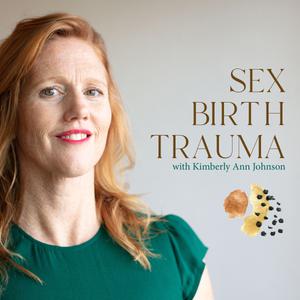
Sex Birth Trauma with Kimberly Ann Johnson
Kimberly Ann Johnson: Author, Vaginapractor, Co-founder of the School for Postpartum Care
- 48 minutes 54 secondsEP 218: Thriving Postpartum - Embracing the Indigenous Wisdom of La Cuarentena with Pānquetzani
In this episode, Kimberly and Pānquetzani discuss her new book Thriving Postpartum: Embracing the Indigenous Wisdom of La Cuarentena and the thirteen year process of navigating that creative act. Pānquetzani reflects on the ways her relationships with partners and her four children have impacted the journey of making a business and writing a book. Pānquetzani’s writing is inextricably linked directly to the work she has done in and for her community around postpartum care, as well as the lessons she learned around mental health and partner agreements along the way. A deep meditation on personal healing and learning how to make and hold boundaries. The episode lovingly asks: how do you listen to your intuition, your womb, and your baby?
Bio
Pānquetzani comes from a matriarchal family of folk healers from the valley of Mexico (Tenochtitlan, Texcoco, and Tlaxcala), La Comarca Lagunera (Durango and Coahuila), and Zacatecas. As a traditional herbalist, healer, and birthkeeper, Pānquetzani has touched over 3,000 wombs and bellies. Through her platform, Indigemama: Ancestral Healing, she has taught over 100 live, in-person intensives and trainings on womb wellness. She lives in California.
What you’ll hear:
-
The 13 year journey of writing a book
-
Differences in how men and women are treated in public as new parents
-
Liberation of separation and divorce
-
The challenge of holding boundaries with mothers-in-law
-
Creating a culture of community care in a colonial context
-
How to navigate who you want in your cuarentena?
-
How to work with narcissism and boundaries?
-
Listen to your womb, listen to your intuition, ask your baby: what do you need?
-
Pain and martyrdom’s role in parenting
-
Respect is connected to access in a relationship
-
A birth story that led to parent/child healing
-
How to be in communication with your womb
Resources
Website: https://indigemama.com/
IG: @indigemama
Book: Thriving Postpartum at Sounds True
22 November 2024, 5:17 pm -
- 45 minutes 39 secondsEP 217: Ordinary Mysticism - Everyday Beauty, Grief, Sexuality and Mystical Awareness with Mirabai Starr
Kimberly and Mirabai Starr engage in a rich and intimate exploration of mysticism, personal loss, spirituality, and the intersection of sexuality and the sacred. They consider how they have each found spirituality in their everyday lives while being mindful of their journeys, cultures, ancestry, and the complexities involved. They discuss Mirabai's new book, "Ordinary Mysticism," which delves into the nature of mysticism and its accessibility to everyone every day. Mirabai emphasizes that mysticism doesn't require institutionalized religion and can be found in ordinary moments. They discuss the profound impact of loss and grief in Mirabai’s life. She describes how these experiences deepened her connection to the sacred and the beauty intertwined with suffering.
Bio
Mirabai Starr is an award winning author of creative nonfiction and contemporary translations of sacred literature. She taught philosophy and world religions at the University of New Mexico, Taos for 20 years, and now teaches and speaks internationally on contemplative practice and inter-spiritual dialog. A certified bereavement counselor, Mirabai helps mourners harness the transformational power of loss. She has written over 15 books, and the latest is “Ordinary Mysticism.” But you'll hear her talk about “Caravan of No Despair,” “Wild Mercy,” and some of her translations from Spanish to English, “In The Mystics,” “The Great Mystics.” She lives with her extended family in the mountains of northern New Mexico.
What you’ll hear:
-
Mirabai's views on spiritual, literary and poetic writing.
-
The origin story of her new book "Ordinary Mysticism" - including it’s connection to Anne Lamott
-
The ease in finding the mystical if you are open to it.
-
The challenges of having that openness in the everyday
-
The intersections of grief and the sacred
-
Cultivating mystical awareness in daily life
-
Searching for spiritual grounding
-
Uprootedness of being spiritual but not religious
-
How to understand your relationship to different spiritual technologies
-
How to tap into spiritual bounty without colonizing and appropriating
-
Intention and attention are crucial for recognizing the sacred in the mundane.
-
The integration of sexuality and spirituality
-
The common split many women feel between the sexual and the sacred aspects of their lives. How healing from/through sexual abuse can lead to sacredness in intimacy
-
What’s a responsible and mindful approach to drawing from various spiritual traditions?
-
How does storytelling and reflecting on shared struggles lead to insights within the spiritual journey?
-
And how ending an abusive sexual and spiritual relationship can lead to healing through new forms of intimacy.
-
Healthy intimacy can be holy
Resources https://mirabaistarr.com/
12 October 2024, 8:47 pm -
- 55 minutes 42 secondsEP 216: Cultural Identity, Ancestry and White Privileges & Poverties with Tad Hargrave
Fellow Orphan Wisdom Scholar, and founder of Marketing for Hippies, Tad Hargrave dives deep with Kimberly into his ever-evolving relationship to whiteness and ancestry. They discuss Tad’s journey into exploring his ancestral roots, language and cultural identity, as well as Kimberly and Tad’s shared rites of passage experiences doing anti-racism work. Tad shares how he initially felt disconnected from indigenous cultures, but found deep resonance exploring his own heritage, particularly his Scottish Gaelic ancestry. The two discuss the polarities of self-loathing and self-glorification amidst contemporary white activists of both the left and right, and the broader implications of whiteness and cultural identity for white individuals. They touch on the importance of considering both privileges and poverties when it comes to whiteness, and also consider the challenges and complexities faced by white people in navigating issues of privilege, guilt when trying to meaningfully engage with marginalized histories and communities. Overall, the conversation delves into the nuanced and often difficult process of reclaiming one's cultural heritage and identity as a white person, and ends on a consideration of how to creatively and meaningfully approach speaking the colonizer tongue of English.
Bio:
Tad Hargrave is a hippy who developed a knack for marketing (and then learned to be a hippy again). He spent his late teens being schooled in a mixed bag of approaches to sales and marketing – some manipulative and some not. When that career ended, he spent a decade unlearning and unpacking what he’d been through. How had he been swept up in it? Why didn’t those approaches work as well as advertised? Were there ways of marketing that both worked better and felt better to all involved? It took him time but he began to find a better way to market. By 2006, he had become one of the first, full-time ‘conscious business’ marketing coaches (for hippies) and created a business where he could share the understanding he had come to: Marketing could feel good. You didn’t have to choose between marketing that worked (but felt awful) or marketing that felt good (but got you no clients). Since 2001, he has been touring his marketing workshops around Canada, the United States, Europe, and online, bringing refreshing and unorthodox ideas to conscious entrepreneurs and green businesses that help them grow their organizations and businesses (without selling their souls). Instead of charging outrageous amounts, he started doing most of his events on a pay what you can basis. He is the author of sixteen books and workbooks on marketing. Tad currently lives in Edmonton, Alberta (traditionally known, in the local indigenous language of the Cree, as Amiskwaciy (Beaver Hill) and later Amiskwaciwaskihegan (Beaver Hill House) and his ancestors come primarily from Scotland with some from the Ukraine as well. He is now dedicated to spending the rest of his days preserving and fostering a more deeply respectful, beautiful and human culture.
What you’ll hear:
-
Tad’s intro to anti-racism and youth organizing work in the Bay Area
-
Tad found himself pushing up against something in anti-racist/white supremacy trainings
-
What is the role of self-loathing in anti-racism trainings?
-
Tad found admiration toward indigenous rituals, but unlike some white peers, didn’t feel drawn to doing more work with indigenous cultures
-
Something changed when Tad began learning his indigenous language
-
Tad came to understand whiteness as a cover for something
-
Whiteness is a kind of forgetting
-
Can a white person participate in a indigenous ritual? Yes, but always as a guest and with consideration for the impact their presence might be having on that community
-
Recognizing that whiteness was trouble, that it was a kind of poverty
-
Tad found he no longer was so anxiously seeking approval from indigenous people and people of color, which he recognized as another form of taking
-
The importance of finding rootedness in ancestral story
-
Kim discusses her experience in urban education in Chicago and studying under Michael Eric Dyson
-
Kim found she was often comparing her ancestor grief to Black peers
-
Kim has found Canada’s links to the older world to be more apparent than the United States
-
Unpacking whiteness is an empty box - there’s nothing there.
-
Where do white people go for culture? Often Black culture in North America
-
You can’t start with shame - you have to remind people who they came from
-
Peter Levine’s idea that you don’t, in locating feelings in the body, rest in what’s good and stay comfortable; but you also don’t stay in the bad and turn to ash.
-
For white people there is no “good” place to go connected to the term white- it’s discomfort all the time.
-
A polarizing time - one end of the spectrum is MAGA which reinforces white supremacy/entitlement the other end is leftist positive reinforcement for self-loathing, guilt, and shame.
-
White privilege gets conflated with cultural appropriation
-
The belief that deep down you are bad is a non-indigenous worldview - it’s a Christian one.
-
A rite of passage in a certain way to be so different than the rest of a room of people.
-
There is privilege in white innocence, wide-eyed and curious about other worldviews, but it is not one that you come out the other side of without recognizing cultural poverty.
-
There are double binds of contemporary identity politics discourse - despite the intention to advocate for another group of people, there is also anticipated criticism for participating in culture or movement that is not your own.
-
After an event, there are lines of young people paralyzed by guilt about being white, male, or part of the settler-colonial class.
-
There’s a lot of learning that can happen if you look back to why people left, further than just North American history.
-
Self-loathing is a collapse onto oneself and self-glorification if a puffing up/posture on a very dark history of genocide, slavery, and racism - they aren’t opposites - they are two sides of the same coin.
-
Dominant society has a tendency to co-opt, and possess everything that is holy.
-
There is no movement that isn’t co-opted by a dominant society - BLM, Feminism, Indigeneity
-
Corporations co-opt every movement without changing their practices - the enemy is that machine.
-
Wendell Berry - live as a machine or live as a creature?
-
Whiteness is a construct of empire.
-
How do you make a living when you want to opt out of empire, late-stage capitalism and try and work on a more human scale?
-
How to find or make the village? Leaving more than you had for the next generation.
-
The origins of a conception of whiteness is privilege - but as you go further there are also poverties.
-
At Orphan Wisdom School Tad saw something not just preserved, but practiced
-
How do we not only preserve ancestral culture but also practice it?
-
What does it mean to make culture in the times and places we are living?
Resources
Tad’s Substack: https://tadhargrave.substack.com/
Tad’s Marketing Business: https://marketingforhippies.com/
Tad on Whiteness: https://healingfromwhiteness.blogspot.com/
Tad’s IG: https://www.instagram.com/marketingforhippies/
Martin Prechtel’s book: Rescuing the Light
Stephanie Mackay’s website: stephaniemackay.ca
8 October 2024, 7:48 pm -
- 1 hour 12 minutesEP 215: Never Land / Sever Land - Dirt, Place, Ancestry, & The Making of Culture From the New World with Stephen Jenkinson
In this episode, podcast producer Jackson Kroopf interviews Kimberly Ann Johnson and Stephen Jenkinson about their upcoming live audio series Never Land / Sever Land - Dirt, Place, Ancestry, and The Making of Culture From The New World. They discuss the impact of their recent trip to Ireland on their ongoing collaboration around culture making in the wake of a global pandemic. They reveal details about Stephen's work-in-progress manuscript and how it relates to orphan wisdom. They consider the implications of the “New World” in contemporary circumstances, the sticky territory of ancestry, and how dirt fits into all of this. A glimpse into a very special offering to come, this conversation gives you a preview into what happens when these two come together to consider the topics and work they’ve devoted so much of their respective writings and teachings to: how to consider (your) place when history is never far past.
Bio
Stephen Jenkinson, MTS, MSW is a worker, author, storyteller, musician and culture activist. In 2010, he founded Orphan Wisdom, a house for learning skills of deep living and making human culture that are mandatory in endangered, endangering times. It is a redemptive project that comes from where he comes from. It is rooted in knowing history, being claimed by ancestry, working for a time he won’t live to see. When not on the road, he makes books, succumbs to interviews, tends to labours on a small farm, mends broken handles and fences, and bends towards lifeways dictated by the seasons of the boreal borderlands.What you’ll here wonderings about:
- What it means for North Americans to visit their ancestral homeland
- The consequences of being cultural orphans
- Native culture and its relationship to whiteness
- What ancestry means to your travel plans
- The difference between making culture from and making culture for...
- Peter Behrens' book "The Law of Dream"
- Stephen's musings on Tobe Hooper and Stephen Spielberg's film Poltergeist
- Back to the land / farming fantasies
- Dirt and its layered wisdom
- Shifts in Stephen's teachings from warnings to descriptors
- The Unauthorized history of North America
- What it means to always feel like you're running
- Why its different to listen to this series live...
- What wellness has to do with all this...
You can learn more and sign up for their upcoming class "Never Land / Sever Land: Dirt, Place, Ancestry, and The Makings of Culture From the New World" from October 20th-November 17th at:
https://kimberlyannjohnson.com/never-land/
photo by Mattias Olsson
1 October 2024, 7:35 am - 1 hour 9 minutesEP 214: Finding Language, Sharing our Stories, and Creating New Worlds around Mothering with April Tierney
In this episode, Kimberly and April discuss her most recent book of poetry titled Matter / Mother which shares about April’s experience of traveling through the underworld of grief, hardship, and heartbreak while mothering her young child. Together, they share their desires for a culture that makes space for the depth of mothering experiences and stories through all of the different seasons of life. They also discuss how to bear the pain and responsibility of both creating a world we want our children to live in while simultaneously inhabiting the one that currently exists. Overall, their vulnerability and honest reflections from their differing seasons of mothering offers language to those deep experiences and possibility for all mothers.
Bio
April Tierney is a poet, activist, craftswoman, mother, and lover of stories. Her work follows threads of ecopoetics, myth, culture, and lineage. She has been nominated for The Pushcart Prize and featured in Orion Magazine, Deep Times: A Journal of the Work that Reconnects, Clarion Poetry Magazine, and Real Ground Journal, among others.
What She Shares:
–”Matter / Mother” poetry and mothering
–Mothering in the upper world while traversing the underworld
–Creative process while mothering
–Motherhood hardship and joys of different seasons
–Creating the world we want our children to inhabit
What You’ll Hear:
–Latest book “Matter Mother” of poetry
–Reading of “Birth Story” poem
–Birth as animalistic and mythic
–Decision behind black cover on book
–Longing for more mothering stories from underworld journey
–Writing a book during early mothering
–Listening to experiences not from our own
–Finding language for mothering experiences
–Finding the right voices on mothering experiences
–Birth culturally accepted as traumatic
–Mothering in the underworld while raising children in the upperworld
–Mothering as existential
–Heartbreak of mothering in these times
–Unable to talk about lived, ongoing way while holding children
–Fantasy of modern motherhood
–Modern living as kind of trauma we learn to cope with
–Four forest fires in three days
–Evacuating from home from forest fires
–Pausing from writing and trusting the quiet places
–Writing as torture until its tended to
–Bringing forth for the world what is asking to come through
–Books as living, breathing things
–Creative portion of mothering in tension with energy and needs
–Kimberly’s surprise of mothering young adulthood
–Grieving and loving during mothering in all phases
–Importance of sharing from different stages of mothering
–Physical versus psychological demands of mothering
–Noticing the glory spots of mothering
–Sending children out into the world
–Creating the world we want our children to live in
Resources
Website: https://www.apriltierney.com/
IG: @apriltierney11
30 August 2024, 1:23 am - 1 hour 9 minutesEP 213: Navigating Single Motherhood, Finding Sisterhood, and Forming Kinship with Marysia Miernowska
In this episode, Kimberly and Marysia discuss how they’ve navigated the challenges and benefits of single motherhood. In many ways, their lives and stories run parallel: surprising pregnancies, marrying into another culture, becoming single mothers with babies, and living out single motherhood while being entrepreneurs. This honest, raw, and tender conversation offers vulnerable testimonies and nuggets of wisdom for other single mothers. They emphasize the difficulties but importance of building kinship and community, undoing internalized shame, and tending to community. Marysia’s School of the Sacred Wild is now open for enrollment with Kimberly as a guest teacher!
Bio
Marysia Miernowska is a teacher, author, Earth activist, green witch, folk herbalist and healer rooted in the Wise Woman Tradition of Healing. Born in Poland, she carries with her a lineage of European folk herbalism. Marysia honors plants as sentient beings, elders, healers and teachers. As a Plant Spirit Communicator, Marysia channels messages from the Earth spirits and guides students to connect with plant spirits through meditation and through their bodies, to receive guidance and learn about the constituents, energetics and properties of plants. Registration is now open for the School of the Sacred Wild and can be accessed through the link below.
What She Shares:
–Journeys into pregnancy
–Trauma and shame around single mothering
–Finding kinship and community
What You’ll Hear:
–Marysia’s surprising journey into motherhood
–Managing cultural differences as a couple
–Traumatic experience becoming a single mother with a baby
–Kimberly’s pregnancy and divorce
–Single motherhood sisterhood
–Navigating single motherhood challenges and joys
–Marysia entering single motherhood
–Receiving judgment for divorcing
–Physical manifestations of wounds and healing
–Functional freeze reactions for survival
–Finding the village as single mothers
–Fairy godmothers and aunties
–Bringing in chosen family for children
–Cultural differences in background and local living
–Anticipating the death of empty nest
–Reviewing mothering choices
–Grief and cultural isolation
–Predictability and calm in hiring anticipatory help
–Working through shame in asking for more help
–Nervous systems and being trapped
–How culture is physically organized disruptive to kinship
–Spontaneous social interactions
–Taking risks and extending our ways of gathering
–Doing it imperfectly and letting go of shame
–Tending to the ecosystem of families, parents, and single mothers
–School of the Sacred Wild herbalism program
–Creating kinship and a deep sense of belonging between human & non-human
–Holding vitality of the Mother archetype and cutting back, releasing, and discerning
–September 7th registration closes
–10% off code for listeners
–Kimberly to guest teach in School of Sacred Wild
Resources
Website: https://www.schoolofthesacredwild.com/
IG: @marysia_miernowska
Course Link for Listeners: here
23 August 2024, 2:14 am - 1 hour 2 minutesEP 212: Hormones to an Evolutionary Biologist - Menopause, Endometriosis, and Grandmothering with Natalie Dinsdale
In this episode, Natalie and Kimberly dive deep into the choose your own hormone phenomenon. They discuss an evolutionary biologist's perspective of individual vs. group think when it comes to women’s health, the connections between hormones and reproductive health issues like endometriosis and PCOS, as well as the evolutionary case for grandmothering.
Bio
Natalie Dinsdale, PhD is an evolutionary biologist, a researcher, an astrologer, a dancer, and a mother. She investigates how evolutionary dynamics shape features of sexuality, reproduction, and health & disease in humans.
What you will hear:
- Carl Jung as inspiration for ideas on individual experience vs. groupthink - mass psychology
- The true person vs. The statistical person
- While individuals matter, her research is on patterns of populations changing over time
- Pregnancy screening for women in late 30s
- Trusting intuition around medical choices
- Endometriosis - is menstrual fluid the cause of legions?
- Bi-polar disorder’s connections to oxytocin
- Do people with PCOS have a uterine that contracts less?
- How does Natalie’s research relate to connective tissue, collagen, and parasympathetic responses?
- Oxytocin doesn’t only mean good
- Trade-offs in evolutionary biology - activities and functions that have to happen for evolution to occur.
- What is the effect of high testosterone in women and PCOS?
- How do females of a species obtain the resources they need to reproduce?
- Choose your own hormone phenomenon in menopause treatment
- There is good evidence that grandmothering has benefits to mothers and daughters
Resources
website: https://www.nataliedinsdale.com/
substack: https://natalield.substack.com/
15 July 2024, 8:08 am - 54 minutes 45 secondsEpisode 211: Travel, Tourism, and Home in a “Post-Pandemic” World with Chris Christou
In this episode, Kimberly and Chris dive deep into the impact of travel on their lives and the consequences of tourism in places they call home. As two world travelers, who have each spent a decade living abroad, Kimberly and Chris consider what they have learned about home, hospitality, and culture from places far from the lands they were raised. They discuss how the pandemic impacted travel to where Chris resides in Mexico, one of two countries that kept its borders open? How Air BnB’s, second homes, and passive income have changed the real estate landscape for future generations? They wonder what it would look like to re-imagine the set of relationships and responsibilities one has if they “belong” to their neighborhood? They ask what if we imagined both our “leisure” and our “work” as connected to the place we live? And how does the question of confinement to home, so relevant to new mothers, show up in the “post-pandemic” summer of 2024?
Bio
Chris Christou is a writer, educational curator, and activist. Born and raised in Toronto, Canada, he moved to Oaxaca, Mexico in 2015 after a decade of delirious wanderlust. In 2016, Chris began concurrently working in and writing about the tourism industry, founding Oaxaca Profundo, a deep learning organization focused on food culture and radical hospitality. In 2021, alongside friends and strangers, he organized and launched the End of Tourism Podcast. He is the author of a book of poetry entitled the Black Braid of Memory, as well as forthcoming books on the psychedelic culture, the unauthorized history of tourism, and radical hospitality. Finally, he is a student of all things chocolate and cacao-related.
What You’ll Hear
- Being at home in other places
- Are places “back to normal”?
- Are we “post-pandemic”?
- Mexico as an escape route for coping with Covid culture
- How is a sense of home impacted by tourism?
- What does it mean to be forced to stay at home and the response is to get as far away as fast as possible?
- Wanderlust - wanting to be everywhere and by virtue of that not wanting to be anywhere
- How much of tourism an unwillingness to be where one is?
- What does it mean to consider what the place you call home needs? And what you can offer that place?
- I don’t think you can be responsible to a place if you’re elsewhere
- The history of mobility in north American Culture
- How to re-neighbor
- Seeing places as temporary makes them disposable
- How the pandemic led to lots of profit-driven real estate aquisitions
- The impact of Air Bnbs in tourist destinations
- Do we make our homes for ourselves or for our parents and others we want to welcome people
- How do locals become second class servants or mascot for Instagram world views?
- Dehumanization is a two way street in the tourist industry
- Leaving one expensive city for a less expensive city you bring the landlords with you.
- The un-sustainability of second homes
- Hospitality is complex - learning a culture to invoke hospitality with the stranger
- How difficult staying at home is for a new mother?
- Feeling confined when trying to make home with a baby
- Having family in and of two cultures
- Travel vegans vs. living it up
Resources
https://www.chrischristou.net/
IG - @zajorino / @theendoftourism / @oaxacaprofundo
31 May 2024, 11:14 pm - 57 minutes 3 secondsEpisode 210: Restore Your Core, Healing Journeys, and Mothering Teens with Lauren Ohayon
In this episode, Kimberly and Lauren discuss her teaching journey, which led to the restorative exercise techniques Lauren offers in the women’s health field. As a lifelong mover, Lauren went through several different yoga trainings and anatomical frameworks to arrive at a simple truth: there isn’t a right or wrong, good or bad when it comes to understanding your body’s needs. They discuss re-writing injury stories, and consider what leads women to medically intervene at different phases of life. In addition, Kimberly and Lauren talk about raising teenage girls. In this open hearted conversation, two somatic experiencing practitioners talk through their way of practicing what they teach.
Bio
Lauren Ohayon isan internationally recognized yoga + Pilates teacher specializing in core and pelvic floor issues. She has been teaching for the past two decades. Lauren creates online exercise programs that are challenging, unique, safe, sustainable and life-changing.
In addition to yoga and Pilates, she is certified as a Restorative Exercise Specialist™, in Neurokinetic Therapy® and in Anatomy in Motion. The web site Holy Shift yoga was her first online baby and has since become this web site under her own name. Nothing has changed but the name. Learn more at www.laurenohayon.com
What You’ll Hear
- Supporting women in training their bodies
- The intersection of Anatomy and the Nervous system
- The pelvic floor world
- Movement as soothing
- Injuries as a yoga teacher
- Needing to dig less healing wells, instead dig one deep well
- Set one on a path of a more mindful way of moving
- Re-writing the stories of our injuries
- Distinguishing anatomy and biomechanics
- Somatic nervous system approach to exercise
- Feldenkrais technique was a big influence
- Letting your body teach you
- What leads us to try and intervene in our bodies as women at different life phases
- Good filters for not entertaining the cult/“you should” mindset
- Diet and protein
- Being sensory following nature and desire for warmth
- Parenting teens
- A mother who was a very experimental/exploratory teen
- Consent communication and safety
- Restoring your core- a central support system that receives and transmits
- To be restorative is to not approach the body through good/bad right/wrong anatomical frameworks
- Accepting the body’s changes with aging
Resources
IG: @thelaurenohayon
Website: www.laurenohayon.com
25 May 2024, 7:19 pm - 50 minutes 17 secondsEpisode 209: The Journey to Becoming a Village Auntie and Girls Group Facilitator with Johannah Reimer
With fellow educator and Orphan Wisdom Scholar Johannah Reimer, Kimberly discusses Johannah’s long cultivated journey with Girl Groups that work on collective rites of passage. They explore the difference between weekend and longer form rites of passage processes for girls crossing the threshold to adolescence and womanhood, as well as ways to de-emphasize soul work that doesn't center "the self." Johannah emphasizes the impact she has seen guiding Girls Groups and their families into relationships that reflect boundaries, values, and connection. Johannah talks through her passionate approach to the Matricarchical archetype, as well as their shared thoughts on being a single parent. Johanna describes her upcoming 9-month Girl Group facilitator training “Pathways to Womanhood” where she shares her elemental curriculum, which has been honed over 10 years of work with girls of all ages. Links to a free workshop and the facilitator training below.
Bio
Johannah Reimer is a soulcentric educator, ceremonialist, teen mentor, and an artist of many trades. Trained as a Waldorf teacher, Johannah has been working with children of all ages for over 20 years and holds a particular passion for tweens/teens striving to meet their developmental needs for mentorship and initiation in a culture that has forgotten how to do so. An apprentice of visionaries: Sage Hamilton and Melissa Michaels of SOMA Source, Johannah has worked for many years as a Waldorf teacher under the guidance of her elder Sage, and as an embodied leader for international youth in movement based Rites of Passage with Golden Bridge & Golden Girls Global.
What She Shares
-
Initiatory rites for girls crossing the threshold into adolescence
-
Village mindedness in a Culture without village norms
-
Severance - a death happening in rites of passage
-
Stepping into a threshold, into a new phase of being
-
What does it mean when girls go on a quest to leave childhood behind and then return back to their parents and community?
-
Parents also cross a threshold when their children go on such a quest.
-
A year long process that she does with 5th graders
-
The conflation of big experiences with rites of passage
-
Distinguishing between a rite of passage vs. a threshold
-
How short-term retreats are often not living up to the term rites of passage
-
Girls Groups are designed for a longer-term structure within a collective
-
The power of collective work vs. over-emphasis on the self
-
Working with teens you sometimes need an iron fist and a velvet glove
-
The power of improvisation when working with teens
-
The power of parents letting go of control
-
Parents fear of their own children: important to assert boundaries/values and stay connected
-
Parents: “Stay true. Stay the course.”
-
As a child of divorce, the challenge of being a single parent
-
Gathering the men around the son of a single mother
-
She describes her upcoming free class for anyone who feels the call to be a village auntie, as well as her intimate 9-month Girl Group facilitator training.
-
The power of the Matricarchical archetype and Village Aunties.
Resources
Pathways to Womanhood - Girls Group Facilitator Training
12 May 2024, 5:30 pm -
- 48 minutes 5 secondsEP 208: Wild Mothering, Elder Mothers, and Mothering the Mothers with Tami Lynn Kent
In this episode, Kimberly discusses wild mothering, elder mothers, and mothering from our centers with Tami Lynn Kent, returned special guest, women’s health healer, elder mother, and teacher of previous Jaguar classes. We discuss how to remain in true relationship with the feminine, unlearning how we’ve embodied patriarchy, and living and mothering from our feminine centers. She also discusses the challenges of mothering during these times, especially for mothers of teens and young adults. Ultimately, she offers deep wisdom and medicine for staying true to our centers during these fractured times.
Bio
Tami Lynn Kent is a women’s health physical therapist, founder of the original method of Holistic Pelvic Care™ for women, and author of “Wild Feminine: Finding Power, Spirit & Joy in the Female Body,” “Wild Creative,” and “Wild Mothering.” She is passionate about the potential in our female bodies and cultivating this vibrant energy that’s meant to run through all aspects of a woman’s life. She draws upon hers daily in mothering three sons now all young adults themselves. Her previous book, “Mothering from Your Center,” is being re-released as “Wild Mothering,” which includes new elder mother wisdom.
What She Shares:
–Deep relationship with the feminine
–Undoing internalization of patriarchy
–Mothering teens during challenges
–Embodied mothering during fractured times
What You’ll Hear:
–Walking in deep relationship with the true feminine
–Boundaries around values and work
–Unlearning embodied patterns of patriarchy within us
–Overcompensation in business
–Bodies giving out from overcompensation
–Women giving up space instead of centering
–Coming into truth of where energy and body are
–Over-extending out of perfectionism and wanting safety
–Helping children find their centers gradually
–Mothering young adults with internet, pandemic, polarization, etc.
–Information is not wisdom
–Importance of listening to embodied wisdom and those with it
–Mothering as a wild journey
–Prioritizing the body and face-to-face
–Embodied presence important to mothering
–Weekly family facetime meetings
–Going through the pandemic with males
–Strain on mothers and families feels higher now
–Lack of safety webs and social supports
–Trends of delaying independence from youth
–Determine of pandemic on isolation and young adults
–Assessing nervous systems after isolating during pandemic
–Embodied care versus smoothing discomfort
–Creative, inspired, moving towards passion, tracking health, connection
–Increase of body images issues in boys
–Getting boys out of looking and more of feeling/felt sense
–Fear of interacting in world
–Tracking and noticing people around us is embodied mothering
–Lost art of tending to home and those around us with presence
–Monitoring screen time for young adults
–Playing online with real peers
–Encouraging children to verbalize online interactions
–Rules as child-specific and season-dependent
–Building trust bridges
–Checking in and checking on
–Creating daily embodied moments with children
–Embodied mothering as the tether
–Presence with children creates more presence within themselves
–Stories we tell our children, stories they hear
–Balancing heavy times as parents
–Lack of deep containers taking toll
–Energetic force pulsing through life
–Reaction versus resonance
–Always new medicine and new hope in true feminine
–Not disassociating from deeper problems
–Living in deep relationship to feminine field
–Tending to our parts of the field is the mending
–Using connection to mystery to do our part
–Repairing a fractured web
–May 11th Mini Mother’s Day Retreat!
Resources
Website: https://www.wildfeminine.com/
IG: @tamilynnkent
4 May 2024, 9:46 pm - More Episodes? Get the App
Your feedback is valuable to us. Should you encounter any bugs, glitches, lack of functionality or other problems, please email us on [email protected] or join Moon.FM Telegram Group where you can talk directly to the dev team who are happy to answer any queries.
 A New and Ancient Story: The Podcast
A New and Ancient Story: The Podcast
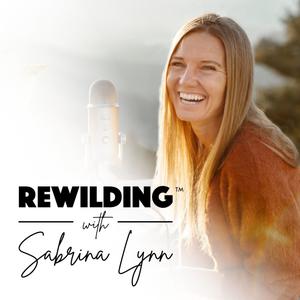 ReWilding with Sabrina Lynn
ReWilding with Sabrina Lynn
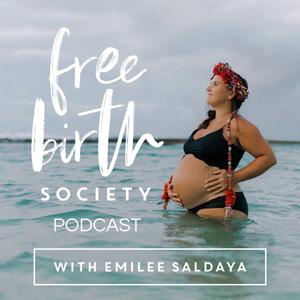 Free Birth Society
Free Birth Society
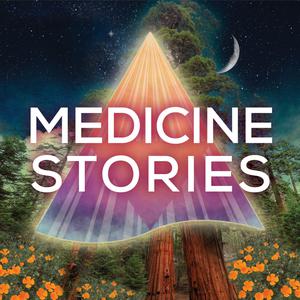 Medicine Stories
Medicine Stories
 SuperFeast Podcast
SuperFeast Podcast
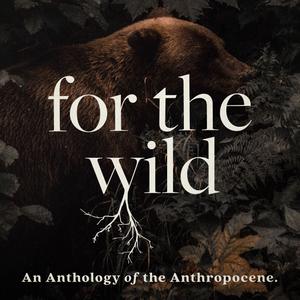 For The Wild
For The Wild